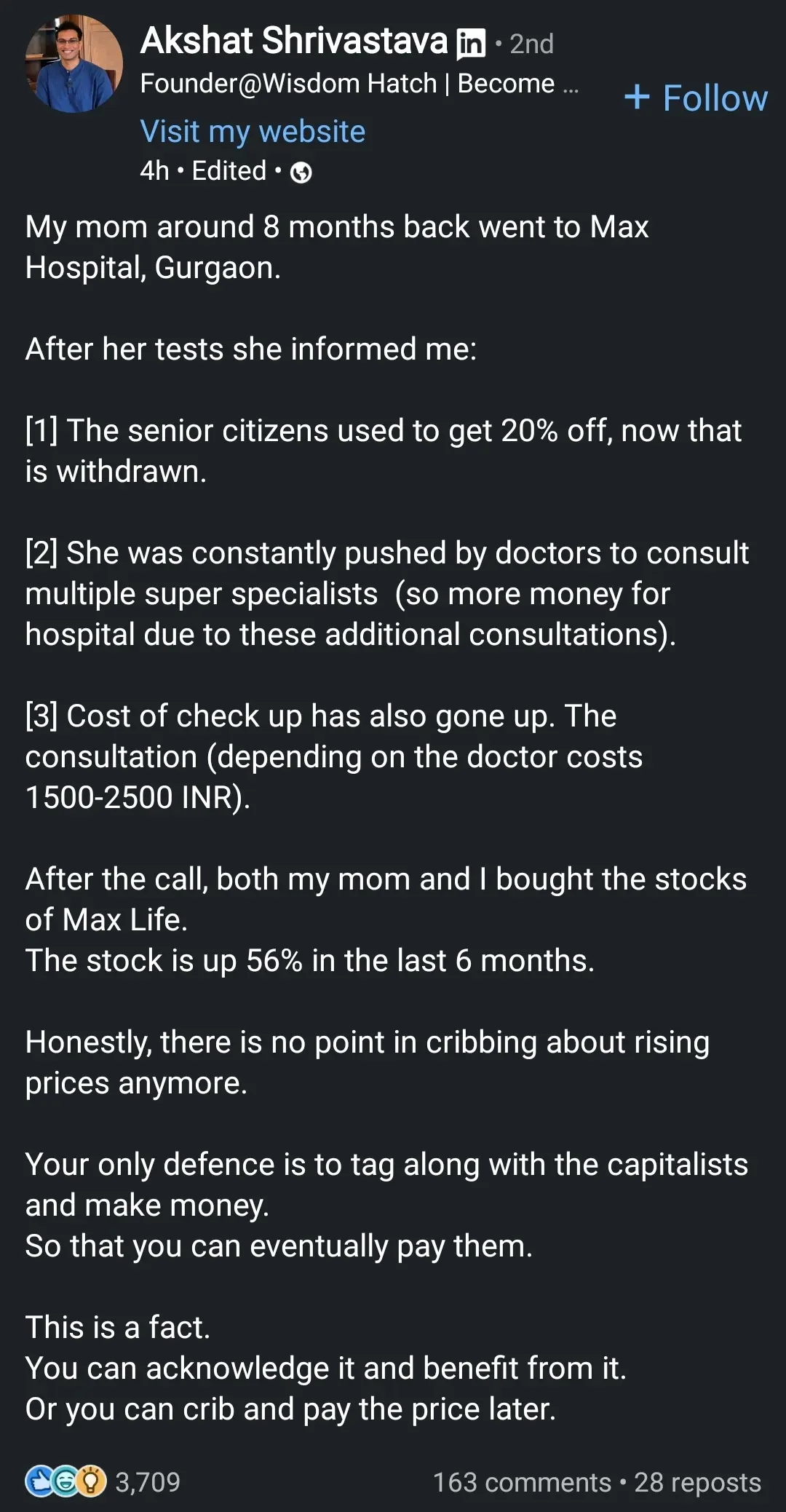this post was submitted on 19 Feb 2024
310 points (95.9% liked)
LinkedinLunatics
3562 readers
5 users here now
A place to post ridiculous posts from linkedIn.com
(Full transparency.. a mod for this sub happens to work there.. but that doesn't influence his moderation or laughter at a lot of posts.)
founded 1 year ago
MODERATORS
you are viewing a single comment's thread
view the rest of the comments
view the rest of the comments

This isn't how pricing is set for medical equipment....... Nor is high equipment cost the reason behind the pricing increase.
Every hospital that accepts Medicare utilizes CMS guidelines when it comes to billing. Medicare sets the general price for items, factoring in things like historic pricing, cost of purchase from vendor, and the price of labour required to fit or make the device function.
The complex and expensive aspect of hospital billing stems from the introduction of private insurance companies. The ones that require more paperwork and processing time than Medicare, and will attempt to make the process as hard as possible.
Because hospitals are a natural monopoly, not only are they prohibitedly expensive, but it's also extremely hard to profit from them in the long term. Which is why there's a large amount of bureaucracy to get them built.
Pretty much every ER room in America is a huge money sink that the rest of the hospital has to economically support. You add too many hospitals, and the services that are profitable get too spread across the area to support their individual ER operations.
Which is why about 10-15 years ago there was a large push from venture capital to build "hospitals" without trauma rooms. These hospitals began to eat up all the funding in the area and began shutting down hospitals with trauma wards. This is when a lot of states adopted legislation that would help curb this behavior.
Banning private insurance is the only thing that would lower prices for Americans. None of the issues you covered are even close to the reason why things are getting expensive.
Not when there's any kind of population density.
But what are those insurance companies processing? If you look at it, it's "special deals" so the agents can get a bonus, it has nothing to do with actually saving their customers money. Hospitals inflate prices so they have room to make cuts so the insurance sales people feel like they're winning.
The problem here isn't with the nature of insurance, but the collusion between insurance companies and care providers. It's a dance they play so everyone feels like they're winning, and at the end of the day the customer is the one that loses. It's not a competitive market, it's a bureaucratic one where you have HR departments, insurance salespeople, and hospitals all propagating the current system because it's lucrative for all of the middlemen.
Medical suppliers want a piece of the action too. That's why we get things like insulin prices going up:
They prevent competition through the patent and regulatory systems, and hospitals and insurance companies are fine with it because they just pass the costs on to the consumer. Consumers don't really have a choice because most insurance comes from employers (who just pay employees less to compensate) or taxes (ACA subsidies). Nobody actually pays the full price, so the system continues.
The same goes on with medical devices, but volume is much lower so it's easier to prevent real competition. Add to that the legal risk for choosing a cheaper product if anything goes wrong and you'll find no incentive to cut costs.
Let's assume we eliminate private insurance, you just change the private collusion to public collusion, and instead of middle managers getting paid in the public sector, you get political favors to keep prices high (e.g. campaign donations). Moving insurance from private to public just moves money from one pocket to another. The true solution here is to expose the collusion, not politicize it. If you want proof of this in action, look no further than the defense department in the US.
Which is because of free riders. The solution to that problem is different: emergency care should be completely publicly funded. It's so expensive because the hospital has to deal with people skipping on their bills and just move the costs to paying customers.
I think we should make ambulances and all non-elective care completely free, provided a paramedic recommends emergency care.
Natural monopolies aren't intrinsically changed by demand.....
It's not the insurance company that is doing the processing. It's the hospitals, they have to hire more and more billing agents just to extract the money that the insurance has already agreed to pay.
Lol, no. By "special deals" you mean 20% less than the Medicare allowable, and if you don't agree then you are no longer in network.
No, they inflate the prices so that when insurance companies ask for less money it doesn't bankrupt the hospital.
You have no idea what you are talking about about...... I'm a provider at a hospital, specializing in orthopedics and rehabilitation. I've never spoken to an insurance agent about pricing. That's not how it works.
Those are pharmaceutical companies, not medical suppliers, they are billed under completely different systems.....
Also, the reason insulin pricing is so high is because Medicare isn't allowed to barter for pricing, largely in part because it would be unfair to private insurance companies who have smaller subscriber groups.
Oh yeah, I forgot how every medical system on the planet was completely fraudulent...... Oh wait, nope, mainly just America.
The biggest way to improve pricing is by group bartering, which is how every other 1rst world nation pays less for medical equipment, treatment and prescription cost than the US.
Again, nothing you said was accurate, and anyone who takes it as so is now dumber than when they began reading. Please stop spreading misinformation about fields of study you do not specialize in.